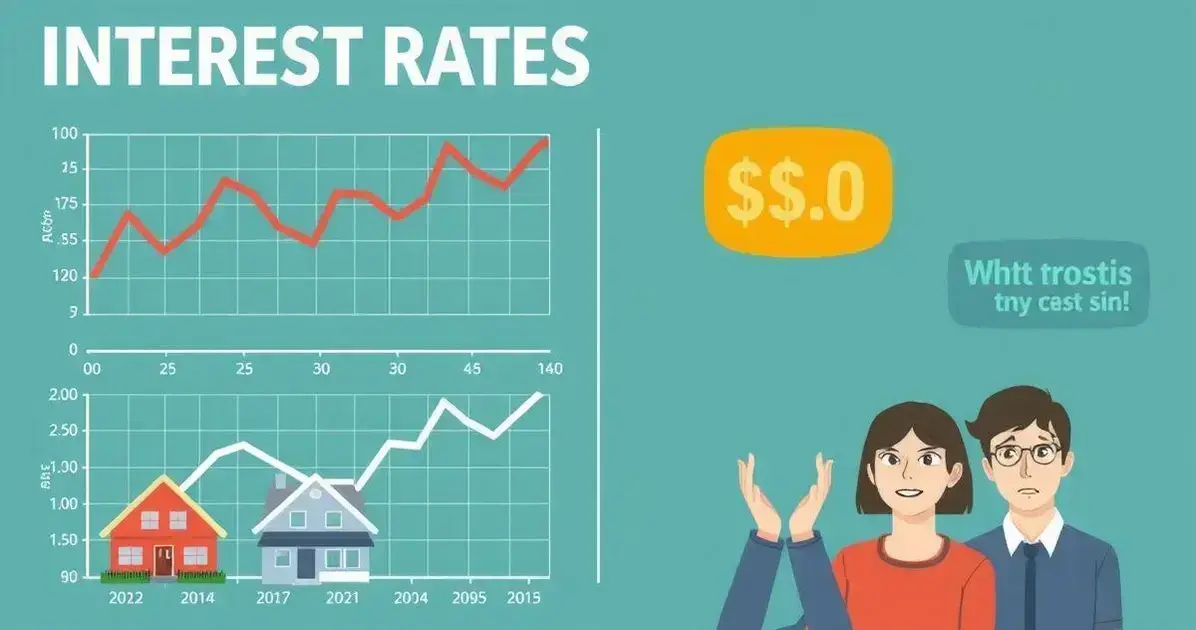ADVERTISEMENT
In today’s fast-paced world, understanding real estate market insights is crucial for anyone looking to invest wisely.
From price forecasts to the impact of interest rates, we will uncover valuable information to guide your decisions.
ADVERTISEMENT
Understanding current trends in real estate
As we step into 2023, understanding the latest trends in real estate is essential for investors.
The market is evolving rapidly, influenced by factors such as technology, consumer behaviour, and economic conditions.
ADVERTISEMENT
Recognising these trends can help investors make informed decisions.
Growth of Remote Work
One significant trend is the rise of remote work, which has changed the demand for residential properties.
Many people are now seeking homes in suburban or rural areas, leading to increased prices in those regions while urban markets stabilise or even decline.
Smart Home Technology
Moreover, the integration of smart home technology continues to appeal to buyers, as it offers convenience and energy efficiency.
Homes equipped with smart devices are becoming more desirable and can command higher resale values.
Sustainable Living
Sustainability is also at the forefront, with many buyers prioritising eco-friendly homes.
Properties featuring solar panels, energy-efficient systems, and sustainable building materials are gaining traction, driving market change.
Shifts in Rental Markets
The rental market is adapting as well. The demand for short-term rental properties has surged, particularly in tourist-favoured locations.
Savvy investors are looking to capitalise on this trend by purchasing properties suitable for platforms like Airbnb.
Urban vs. Suburban Preferences
While urban areas have traditionally been the focal point for property investments, the preference is shifting towards suburbs.
This change is driven by desires for more space and affordability, redefining property investment strategies.
Market Responses to Interest Rates
The fluctuation of interest rates is also impacting buyer behaviour.
As rates rise, more potential buyers may take a step back from the market, influencing property prices and timelines for buyers.
Investor Education
Lastly, the importance of education in investing cannot be overstated.
Investors are increasingly seeking information and resources to understand market shifts and make informed choices.
Workshops, seminars, and online courses are now more popular than ever.
Forecast for property prices
The forecast for property prices in 2023 hinges on several key factors that investors must analyse carefully.
Recent trends show that property prices have been fluctuating due to economic conditions, interest rates, and supply chain issues.
Current Market Overview
Many experts predict a gradual increase in property values, particularly in sought-after suburbs.
As urban centres experience a slight decline, suburbs turn into hotspots for buyers searching for affordable housing options.
Influences on Price Trends
Generally, property prices may rise moderately because of steady demand and limited supply.
The limited number of homes on the market is likely to keep competition high, thereby driving up prices.
Economic Factors
Additionally, economic indicators, such as employment rates and GDP growth, play a crucial role in shaping the property market.
A strong job market can lead to increased homebuyer confidence, further supporting price growth.
Regional Variations
While national trends are important, it’s essential to look at regional variations as well.
Certain cities and neighbourhoods may experience faster price increases due to local demand, infrastructure development, and community investments.
Long-term Projections
In the long term, analysts expect property prices to continue to trend upwards.
However, potential investors should prepare for more volatility as interest rates change and economic conditions evolve.
Advice for Investors
Investors should stay informed about market forecasts and work closely with real estate professionals.
Understanding local dynamics and keeping a close eye on economic indicators will help in making informed decisions regarding property investments.
Impact of interest rates on housing market

The impact of interest rates on the housing market is significant and can affect both buyers and sellers.
When interest rates rise, borrowing becomes more expensive.
This affects how much money buyers can afford to borrow, which can lead to lower demand for properties.
Higher Borrowing Costs
Higher interest rates mean that monthly mortgage payments increase. This often leads to a decrease in affordability for many potential homebuyers.
Consequently, a decrease in demand can cause property prices to stabilise or even decline in highly competitive markets.
Investor Strategies
Investors should be aware of how fluctuating interest rates can influence their strategies.
If rates rise, they may need to adjust their expectations regarding return on investment and adjust pricing strategies when selling properties.
Market Sentiment
The overall market sentiment can be negatively impacted by rising interest rates.
Uncertainty regarding the economic environment can lead to hesitation among both buyers and sellers, causing delays in transactions.
Effects on Refinancing
Additionally, higher interest rates can affect those looking to refinance their existing mortgages.
Many homeowners may choose to hold onto their current loans if they secured lower rates earlier, leading to fewer properties available in the market.
First-Time Homebuyers
First-time homebuyers are particularly affected since they generally have tighter budgets.
Rising interest rates can make it challenging for them to enter the market, potentially slowing down the overall activity in the housing sector.
Long-term Considerations
Over the long term, fluctuating interest rates can create an uncertain environment for the housing market.
Home values may continue to rise and fall with the changing rates, and this trend could affect investment decisions.
Key areas for real estate investment
Identifying the key areas for real estate investment can significantly influence an investor’s success.
In 2023, several prime locations and sectors stand out as particularly lucrative for property investment.
Emerging Urban Areas
Emerging urban areas are becoming hotspots for investors looking for growth.
Cities that are undergoing revitalisation or population growth typically offer better appreciation potential.
Investors should focus on areas with new infrastructure projects and development plans.
Suburban Markets
With many people opting for more space due to remote work, suburban markets are gaining popularity.
Investors should consider buying residential properties in commuter towns with easy access to the city.
These areas often attract families and individuals looking for more affordable housing options.
Multi-Family Units
Investing in multi-family units is a smart choice for those looking to generate consistent cash flow.
As rental demand rises, properties that accommodate multiple tenants provide a stable income source and reduce vacancy risks.
Commercial Real Estate
Commercial real estate, particularly in sectors like logistics and warehousing, is on the rise.
The shift towards online shopping has increased demand for distribution centres, making this area a significant opportunity for investors.
Vacation Rental Markets
Regions popular for vacation rentals also represent significant potential.
Investors can take advantage of platforms like Airbnb by purchasing properties in prime tourist destinations, capitalising on seasonal demand.
Green and Sustainable Developments
Investors focused on sustainability can tap into the market for green buildings.
Eco-friendly developments are increasingly sought after, with buyers actively looking for energy-efficient properties that reduce their carbon footprint.
Technological Hubs
Finally, investing in areas known for technological innovation can be beneficial.
Cities hosting tech companies or startups often experience rapid growth, making real estate investment in these locations a wise strategy.
Emerging markets to watch
In 2023, certain emerging markets present compelling opportunities for savvy real estate investors. Watching these markets can lead to significant future rewards.
1. Secondary Cities
Secondary cities are experiencing population growth as people move from larger urban centres seeking better quality of life and affordability.
Cities like Durban and Port Elizabeth in South Africa are beginning to attract more investors.
2. Developing Suburbs
Many suburbs are seeing new developments, with improved infrastructure attracting buyers.
These areas often have lower property prices compared to city centres, making them appealing for first-time investors.
3. Coastal Areas
Coastal regions, particularly those with strong tourism appeal, continue to see a rise in property demand.
Investment in places like the Garden Route can offer great rental returns during peak holiday seasons.
4. Tech Hubs
Regions developing into tech hubs, such as Cape Town, are attracting young professionals.
This demographic increase boosts demand for housing, making these locations ripe for investment.
5. Areas Near University Towns
Properties near universities often have a steady demand for rental houses and apartments.
Renting to students can provide consistent income, making university towns, like Stellenbosch, good investment spots.
6. Regeneration Projects
Investors should look for areas undergoing regeneration projects.
Developments aimed at revitalising the urban landscape can lead to increased property values, especially in places like Johannesburg.
7. Sustainable Developments
As demand for eco-friendly living grows, so does the potential for investment in sustainable developments.
These projects can attract buyers interested in eco-conscious living, highlighting rising markets prioritising sustainability.
Tips for first-time home buyers

For first-time home buyers, entering the real estate market can feel overwhelming. Here are some essential tips to make the process smoother.
1. Know Your Budget
Before you start house hunting, determine how much you can afford. Take into account your savings, monthly income, and expenses.
Use an online mortgage calculator to estimate your potential monthly payments and loan amounts.
2. Get Pre-Approved
Getting pre-approved for a mortgage gives you a clear idea of your budget and shows sellers you are serious.
Talk to multiple lenders to find the best rates and terms.
3. Research the Market
Familiarise yourself with current market conditions in the areas where you want to buy.
Look at home prices, average time on the market, and neighbourhood amenities.
4. Make a Wish List
Create a list of must-haves and nice-to-haves for your new home.
Consider factors like the number of bedrooms, outdoor space, and proximity to schools or work. This can help narrow down your choices.
5. Work with a Real Estate Agent
Engaging a qualified real estate agent can be invaluable.
They possess local knowledge, can help you find properties that meet your criteria, and guide you through the negotiation process.
6. Don’t Skip the Inspection
A thorough home inspection can uncover hidden issues. Always invest in an inspection before finalising your purchase to avoid unexpected repairs later.
7. Be Prepared to Negotiate
Don’t hesitate to make an offer below the asking price, especially if the property has been on the market for a while.
Your agent can advise you on a fair offer based on market conditions.
8. Understand Closing Costs
Be aware that closing costs can add up to 2-5% of the home’s purchase price.
These costs can include title insurance, appraisal fees, and legal fees that you will need to budget for.
9. Don’t Rush the Decision
Buying a home is a big commitment. Take your time to find the right property that fits your needs and budget, so you don’t experience buyer’s remorse.
Common pitfalls in real estate investing
Investing in real estate can be rewarding, but several common pitfalls can lead to costly mistakes. Being aware of these can help you make smarter decisions.
1. Neglecting Research
Failing to conduct thorough research on a property and its surrounding area is a major pitfall.
It’s essential to understand local market conditions, property values, and future development plans.
2. Overestimating Returns
Many investors overestimate their expected returns. Having a realistic view of rental income and appreciation rates can prevent disappointments.
Always consider potential vacancies and unexpected costs.
3. Skipping Property Inspections
Skipping the home inspection to save money can be a big mistake. Inspections can uncover hidden issues that could lead to significant repair costs.
Always invest in a thorough inspection before purchasing.
4. Ignoring Cash Flow
Many new investors focus too much on the property’s value rather than its cash flow.
It’s crucial to ensure that rental income covers mortgage payments and other expenses to avoid financial strain.
5. Lack of a Clear Plan
Not having a clear investment strategy can lead to inconsistent decisions.
Define your investment goals, whether it’s for rental income, flipping houses, or long-term appreciation, to create a focused approach.
6. Getting Emotionally Involved
Making decisions based on emotions rather than logic can lead to poor investments.
Stick to your research and investment strategy when making offers and don’t let emotions cloud your judgement.
7. Underestimating Expenses
Many investors fail to account for ongoing expenses, such as maintenance, property management, and taxes.
Create a comprehensive budget that includes all potential costs to avoid being caught off guard.
8. Not Understanding Financing Options
Failing to understand different financing options can limit your purchasing power.
Explore various mortgage products and choose the one that fits your financial situation best.
9. Rushing the Process
Rushing into a property purchase can lead to regrets.
Take your time to evaluate your options and ensure you’re making informed decisions before committing to a purchase.
In Summary: Key Insights for Real Estate Investors
As we navigate through 2023, understanding the real estate market insights is essential for every investor.
From grasping current trends and forecasting property prices to recognising the impact of interest rates, making informed decisions is crucial.
Being aware of key investment areas and emerging markets can unlock new opportunities.
This is especially important for first-time home buyers, who should approach the market equipped with knowledge and strategy.
Moreover, avoiding common pitfalls in real estate investing can save time and money, ensuring a smoother journey.
Whether you are looking to invest in rental properties, multi-family units, or exploring commercial options, a well-thought-out plan can lead to success.
Ultimately, staying informed, conducting thorough research, and seeking expert advice will help you build a profitable real estate portfolio.





